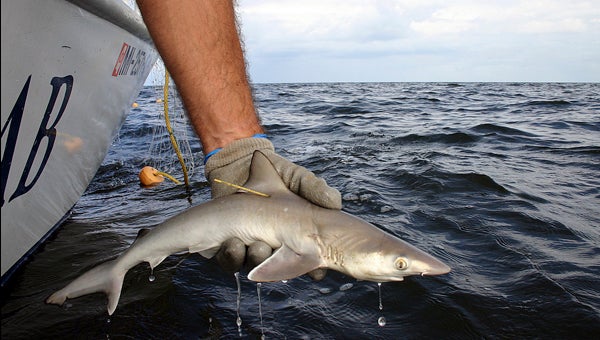Estuarium hosts shark researcher in summer science series
Published 8:34 pm Thursday, July 30, 2015

UNIVERSITY OF SOUTHERN MISSISIPPI
SOUND NURSERY: ECU shark researcher Charles Bangley will discuss sharks in the Pamlico Sound during a summer science talk at the North Carolina Estuarium on Aug. 6. Bangley has tagged and tracked over 2,000 sharks in his career.
In March, a tagged great white shark named Katherine made her way sound side through the Outer Banks, reaching Swan Quarter before turning back for open ocean. In June and July, eight shark attacks happened in coastal Carolina waters.
Sharks are on many people’s minds, especially those spending vacation time at the beach this summer. But one doesn’t have to travel that far to satisfy his/her curiosity about sharks when biologist and shark researcher Charles Bangley is coming to Washington to share highlights of what he’s learned about sharks in the Pamlico Sound.
On Aug. 6 at 7 p.m., Bangley will speak at the North Carolina Estuarium as the third speaker in the Estuarium’s Thursday summer science talks series. His program, “Sharks in the Sound,” will illuminate some of the mysteries surrounding sharks — mysteries he’s helped uncover. The East Carolina University PhD candidate has tagged over 2,000 sharks in his career, according to Russ Chesson, the Estuarium’s programming specialist. If anyone knows where the sharks are, it’s Bangley.
“He’s tagged approximately 2,200 sharks, but then again the sharks are anything from a dogfish to a bull sharks. They have transponders implanted in them and he can track each one of them,” Chesson said. “He knows about sharks in the Pamlico, on the beach and where they’re traveling. He’s the guy.”
One of Bangley’s research areas is the study of bull sharks and how their numbers in the Pamlico Sound have grown in recent years. According to a recent interview with The Virginia Pilot, Bangley said the cause is the rise in water temperatures: bull shark females are content to stay in the thriving habitat of coastal North Carolina, rather than Florida.
Bangley’s hour-long program will also allow time for questions from the natural science buffs in the audience — a more adult audience the Estuarium is trying to attract through the science talks series, Chesson said.
“Our children’s programs have remained the same, but we’re trying to do more outreach to the adult learning community and do these scientific talks,” he said.
While the program is aimed at adults and older children, Chesson said anyone with an interest is welcome.
“There’s always more we can know about the natural world around us,” Chesson said.
Reservations are required for “Sharks in Sound” and a $4 per person program fee will be charged. Call 252-948-0000 for more information.





